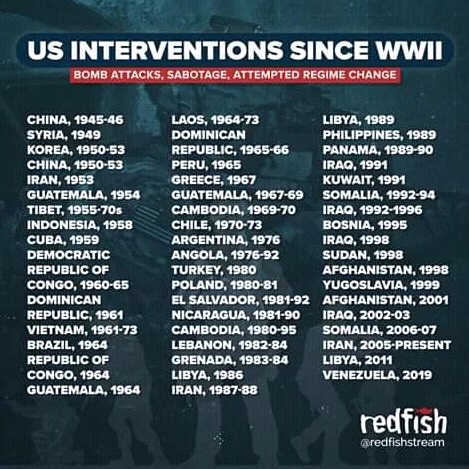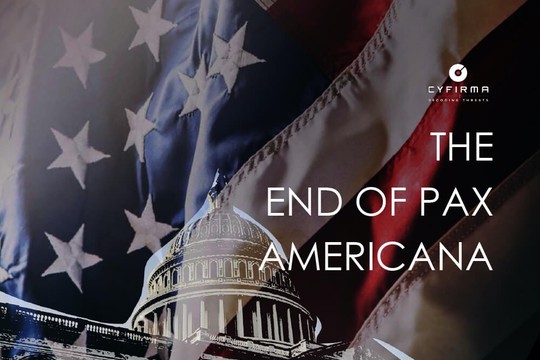Pax Americana is gone, ‘The Foreign Affairs’ claims.
Born with the Japanese attack on Pearl Harbor on December 7, 1941, the U.S.-led international rules-based order died with the second inauguration of Donald J. Trump. The president has long maintained that this order disadvantages the United States by saddling it with the burden of policing the globe and enabling its allies to play it for a sucker. “The postwar global order is not just obsolete,” Secretary of State Marco Rubio declared in his Senate confirmation hearing. “It is now a weapon being used against us.”
Trump’s skepticism about U.S. support for Ukraine and Taiwan, his eagerness to impose tariffs, and his threats to retake the Panama Canal, absorb Canada, and acquire Greenland make it clear that he envisions a return to nineteenth-century power politics and spheres of interest, even if he does not frame his foreign policy in those terms. In that era, the great powers of the day sought to divide the world into regions that each would dominate, regardless of the desires of those who lived there — a vision of the world that Trump explicitly echoes. Trump sees few significant U.S. interests outside the Western Hemisphere, considers alliances to be a drain on the U.S. Treasury, and believes the United States should dominate its neighborhood. His is a Thucydidean worldview — one in which “the strong do what they can and the weak suffer what they must.”
Although the era of Pax Americana produced extraordinary achievements — the deterrence of communism, unprecedented global prosperity, relative peace — it also planted the seeds of its own destruction well before Trump’s ascent. American hubris had led to costly, humiliating wars in Afghanistan and Iraq, and the 2008-09 financial crisis shattered faith in the U.S. government’s competence and policy prescriptions. One can understand why some Americans might feel their country would fare better in a different, might-makes-right world.
Chinese President Xi Jinping and Russian President Vladimir Putin have long resented Pax Americana. They have learned to work together to counter U.S. influence, especially in the global South. And unlike Trump, they do not face internal checks and balances on their power. They could overplay their hands and generate a backlash to their ambitions. But if they do not, Trump’s gamble could easily go awry, leaving Americans, and the rest of the world, less prosperous and less secure.
Trump’s goal is to increase Washington’s sway in the Western Hemisphere does in fact have some strategic logic. The Panama Canal is a vital sea route for U.S. commerce. Roughly 40 percent of all U.S. container traffic passes through the waterway, and nearly three-quarters of all containers sailing through the canal originate in or are destined for the United States. U.S. security would be endangered if another great power controlled the canal. Greenland’s strategic importance, meanwhile, has grown alongside climate change — a phenomenon that Trump ironically insists is not occurring. The melting of the Arctic ice cap will soon create a new northern waterway, bringing additional military vulnerabilities to northern North America. Greenland also boasts large reserves of the critical minerals that the United States needs for clean energy technologies. And making Canada the 51st state would eliminate trade barriers between the two countries, in theory reducing economic inefficiencies and potentially enriching people on both sides of the border.
Washington, however, has already achieved many of these strategic objectives without resorting to threats. Canada and Mexico may agree to do more, at least symbolically, to secure their borders.
Trump, moreover, appears comfortable with ceding spheres of influence to China and Russia if they return the favor. He has blamed Ukrainian Zelensky, not Putin, for the war in Ukraine, and he favors resolving the Ukraine war with an agreement that cedes Ukrainian territory to Russia and bars Ukraine from joining NATO. Asked in 2021 whether the United States should defend Taiwan militarily, Trump answered that if China invades the island, “there isn’t a fucking thing we can do about it.” And Trump is comfortable with downgrading postwar alliances that extend into supposed Russian and Chinese spheres of interest. He has, for instance, repeatedly questioned the value of NATO (whose expansion he blames for triggering Russia’s invasion of Ukraine) and threatened to withdraw U.S. troops from South Korea. He views such alliances as bad investments that saddle the United States with the cost of protecting countries that, to add insult to injury, also steal jobs from Americans.
Like Putin and Xi, Trump also believes that economic power should be used as a lever to extract concessions from countries that displease him.
Trump’s approach may yield some successes. But the United States’ return to nineteenth-century power politics will likely not yield the bonanza that Trump has promised. Until now, Washington’s network of alliances has granted the United States extraordinary influence in Europe and Asia, imposing constraints on Moscow and Beijing at a scale that neither power can replicate. Ceding that advantage will come at great cost to the United States: not only will erstwhile U.S. allies no longer follow Washington’s lead, but many could also seek safety by aligning themselves more closely with Russia and China instead.
The United States could also fail at naked power politics simply because China and Russia may be better at it. Beijing and Moscow have not hesitated to inflame the world’s resentment of America, emphasizing the United States’ purported hypocrisy for prioritizing Ukraine as conflicts rage elsewhere and for ignoring the high civilian casualties incurred in Israel’s war in Gaza. Those efforts will likely ramp up as Trump turns to threats to pressure friends and neighbors; as a result, Washington will almost surely lose some ability to attract support.
What the United States’ Asian and European allies do also matters. These countries will be tempted to try to please Trump, whether by showering him with praise, feting him with state visits, or offering preemptive concessions such as purchasing more American-made goods. Those efforts, however, will not endear them to him. Trump will happily pocket those wins and see them as vindication of his might-makes-right approach. But he will not take up the United States’ old mantle of global leadership.
To earn Trump’s respect, U.S. allies must demonstrate strength. Whether they have the capacity to do so is an open question. First, they must recognize that the era of Pax Americana is over and the era of power politics has returned. The one thing Trump understands is power — and if U.S. allies work together, they can confront him with plenty of their own. If they succeed in mobilizing their resources collectively, they may also be able to blunt some of Trump’s worst foreign-policy impulses. That may in turn create the opportunity down the road to forge a new global order that matches Pax Americana. But if they fail, a darker era of unchecked power politics awaits — one that is less prosperous and more dangerous for all.
…It's funny to read about how Russia and China conduct "power politics".
It is the US constantly in wars, committing aggression in all corners of the World.
Here is a list of conflicts involving the CIA or US Army during the post-World War II period. Almost every year there is an American war and aggression.
This is the Pax Americana!

read more in our Telegram-channel https://t.me/The_International_Affairs

 10:19 09.02.2025 •
10:19 09.02.2025 •























